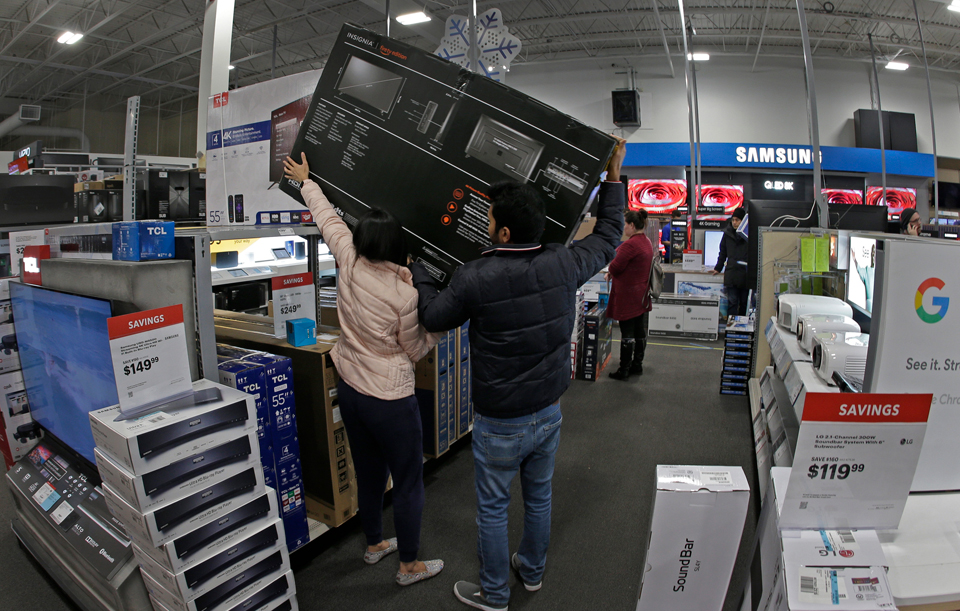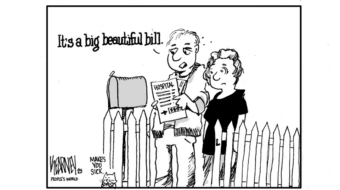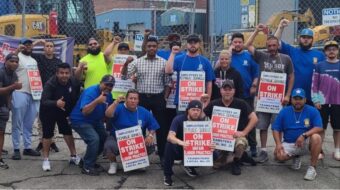
I’m tired, frustrated, and overworked. My partner is currently running a fever and, on and off, I’m experiencing headaches and a tight chest. The tech store where I work as a salesman, located in the New York metropolitan area near the New Rochelle containment zone, is busier than ever. I’ve come into contact with over a thousand people in the past week, mostly older people.
I have no way of knowing whether I have COVID-19.
Each day, I’ve seen, in real time, the failure of our collective response. I am still being made to come into work because, as we are an electronics supplier, ours is “a critical infrastructure industry,” to quote a letter sent around to workers from our company’s lawyers (the same lawyers who, no doubt, have successfully lobbied for us to remain open).
No, the social distancing rules are not being followed, as people are determined to walk right up to me and ask me to locate some frivolous item that they will not need during the next few weeks. No, my employer, which is making money hand over fist, will not offer any incentive to stay home. I feel really drained; I’m an “essential” worker for the economy.
Throughout this past week, more and more electronics stores have closed. Mine, however, has decided to stay open. As a result, I’ve come into prolonged contact with more people than during any other short period of time at my job.
Starting about a week and a half back, when it was declared that the number of cases was rising in New Rochelle and a “containment zone” would be set up, a woman came in looking for a tripod for her iPad. “The plan is,” the customer said “one parent will be allowed into my son’s basketball game. That’s me. And I’ll livestream the game for all the other parents to watch.”
I said it made sense with everything going on. And almost, as if it were a badge of honor, she said: “I live in the containment zone actually!” She wasn’t the only one that day that from New Rochelle seeking to panic buy some printer, TV, or computer for the eventual months spent working from home.
A very nice, old Jewish woman bought a printer and asked me how to set it up. We talked about Poland, Israel, and what I was studying. As I was setting up the printer for her, she gets a call. On the phone, her daughter informs her that she thinks her grandson is experiencing symptoms of COVID-19: chest tightness, fever, fatigue. The printer is finished setting up. The woman thanks me and rushes off to assess her family’s situation. Within the first day of taking serious action, I’ve possibly come into contact with two people who have potential COVID-19 exposure.
I should also say that, like most of my friends, we’re not feeling worried anything will happen to us. We’re young, scrolling Twitter all the time, and receiving the latest stats, figures, and stories about the spread of the virus. We’ll be fine, for the most part, hopefully. We’re really scared for our parents and loved ones.
The woman who rushed off to her family to support them is doing what any reasonable person would do. But am I—a working-class college student whose diabetic 61-year-old father who is still working and was just released from the same hospital that the first COVID-19 patient was taken to days prior due to an infected blister on his already swollen foot with amputated toes—afforded the same luxury of worrying?
Do I have time to worry? It’s probably for the best that—because I am working so much or going over to my partner’s house (which besides my house or work is the only other place I’ve been to in the past few weeks)—I haven’t seen my Dad.
I try to avoid the areas of the house where he normally is. I limit my movements to the kitchen, bathroom, and my room. The rest of the space in our tiny Bronx apartment is left to him and my Mom. Can my friends who work in “essential” food or retail jobs afford to become vectors of death to the people in their communities or to their parents with underlying health issues?
By March 13, more people were getting scared. The store was busier than the holiday season that just ended. This continued into last week as day after day more and more people came in looking to stock up on electronics. There was the man who bought nearly $7,000 worth of televisions. During our transactions, he saw that I was trying to maintain a comfortable distance, which in a crowded store, was about three to four feet. “I don’t have the Corona,” he says in an exhale.
Well, good, I thought, let’s keep it that way. Just because you don’t think this is serious or you don’t know that I, as a young person, could have the virus but just show mild symptoms and still spread the disease to you doesn’t mean that I don’t want to keep my distance.
His face was puzzled at my slow inching away at his slow encroachment on my space. I understand his reaction. In a normal situation, I wouldn’t consider anything “my space.” I wouldn’t be suspicious, as the rest of us now are, of a person’s proximity, cough, or sneeze. I wouldn’t be constantly putting Purell all over my hands. I wouldn’t have the paranoid mind of a suburban, white Lifetime movie mom who is overly conscious of every little intrusion on her life.
But now, for other people’s safety, I have to act like a Lifetime mom. My store, while offering hand sanitizer (which is already running out) and Lysol wipes (which are, also, already running out) has not done anything to offer extra safety precautions. The company hasn’t offered gloves or masks that are ineffective at stopping the virus but might at least offer some peace of mind. For retail workers, our places of work are doing nothing to actually protect us.
There are of course interesting interactions that stand out during this past week, but for the most part, the experiences of the thousands of people I’ve helped are blending together into a crumpled ball of rage. I keep thinking, “Why won’t you all stay home?” I have to be here.
As a matter of fact, the company has sent out an email incentivizing workers to come in. If you achieve a very vague and ill-defined “near-perfect attendance” until the month of April, the email reads, you’ll get a $600 bonus if you’re a full-time worker and $300 if you’re part-time. No desire to reduce the workforce at my job. And the only way you can get paid sick leave is by using up all your sick days (which, for me is nearly none), or get tested for COVID-19, have the test come back positive, and collect two weeks of pay during your absence. With the shortage of tests, this seems improbable.
We’ve also been told that we can just stay home, without “penalty,” which if you’ve ever worked in a low-wage, hourly position just means that you won’t get written up or scolded like a child for not showing up consistently. Yet, my managers have also asked us to come in early. They’ve repeatedly sent around messages saying that we should come in earlier than the time posted on our schedule. Think about your coworkers, the messages read, and the thousand customers coming through the door, they really need your help. A mass email was sent from the president of the company telling us that we’re “heroic” in our “contribution against our nation’s battle against COVID,” and that it’s great we’re still coming into work.
Of course, these contradictory statements and desires from my company are all purposeful. Let’s say someone, or a bunch of people, can trace back that they got COVID-19 at my job. Well, the company lawyers would say, we told our workers to stay home; we told them that if they got COVID-19 they could get some form of paid leave. Yet, right now, as my Dad’s place of work is shut down and my Mom’s freelancing gigs are slowing, I cannot afford to take time off.
We have rent to pay in notoriously expensive New York City, and there are prescription drugs to buy for my parents. I won’t qualify for the paid sick leave Congress is thinking about passing (which will only apply to 20% of the workforce anyway). Like the millions of “essential” workers across the country, this is the predicament we’re in right now. Stay home and possibly starve or go to work and risk the health of thousands of people.
So, I’m angry. I’m angry that celebrities can cry in their mansions because they will have to sit and watch their 8K television for a month or two. I’m angry that I’m “essential,” but I don’t have the paycheck or a union to show for it. I’m angry that no one is listening to the working people who are still making the world run. I’m angry the professional and managerial class is privileged enough to work from home and then go out to needlessly shop for a better webcam or better printer to tide them over during this time. I’m angry that a good plurality of the people that come into the store aren’t even looking for “essential” work from home items but instead are still jaunting around the store as if they hadn’t just been made to stand outside the store for twenty minutes so that we could limit the total number of people in the store throughout the day.
That plurality is still in a dream world where everything is normal and nothing is crumbling before our eyes. I’ve had several customers still taking their sweet time to mull over which printer to get or become visibly dismayed when I tell them that due to “everything going on” (which has become the euphemism I’ve used for the crisis), we’re sold out of a certain model. The contemplative customer, which is all of them, comes into contact with more people, directly or indirectly, the longer they wait. Can beggars be choosers? Apparently, the beggars still think they can be.
In Marx’s theory of commodity fetishism, the “theological” and mystical nature of the commodity masks its production formation. The commodity as a magical object in circulation hides the fact that an underpaid worker made the commodity, that it was made with expropriated resources, and that it is sold to make a profit in order to make a few people rich and powerful. Well, people are coming face to face with the workers that stock shelves, that are tired and probably infected, that make the consumer society we live in retain that tint of magic, retain the idea that every day mana falls from the heaven and lands into your local department store, supermarket, or retail outlet.
It has not taken away the fetish of the commodity, if anything it’s heightened it. It is the lack of disruption in capitalism that could solve this COVID-19 crisis that I’m angry about as well. A mandatory quarantine, a tax on the richest to pay for unemployment benefits, and a nationalized health care service so people wouldn’t have to worry about cost would be great. Unfortunately, none of this will happen.
During the busiest day that I’ve been at work during this period, a cashier’s break was cut down to 30 minutes. The lines were getting too long, and her manager told her that they needed more people to shorten the lines at the registers. A co-worker of mine that sends money to his family back in the Dominican Republic has been battling a nasty cough and has been feeling tired for the past week. We joke, and by “we,” I feel all of us at my job, that we already have COVID-19.
I have another co-worker who is in his 60s and due to great coincidence has been on vacation this past week, thus shielding him from any possibly infected people. Should he still come in, even though he’s in the prime demographic to be hurt by this virus? I have another co-worker already staying home this past week from flu-like symptoms but, because (at the time of my writing this) the one drive-thru testing site is too far away from where she lives, she doesn’t know if she has COVID-19. As a result, she can’t test positive, receive sick pay, and now has to use all her vacation days.
I include these experiences here in order to show you the anxieties and fears of the working class, the dedication to a job that does not care about our well being, and the collective and political failure to institute “social distancing.” All of these stories and experiences have been had many times before. They’ve been told during times of crisis and normalcy, and are playing out a million times across America each day.
As my company continues to operate business this week, think of how each of us has come into contact with about a thousand people, all of whom live relatively close to the epicenter of the American outbreak, and determine whether it’s worth it. Determine if it’s worth propping up an economic system that makes poor people choose between work and death, and wherein some cases the dichotomy becomes blurred.
The only reason my “essential” work is still ongoing is to continue some small semblance of the production/consumption flow to keep capitalism running. As some in government move too quickly to “balance” the economy and people’s lives, more and more people will get sick and die. When thousands of “essential” workers continue to work this week, keep these underlying issues in mind.
A brief comment to end this: What is “social distancing?” There’s an obvious production-based explanation that I’ve offered through my personal experiences outlined above, but something in our consumer society, in the ideologies of capitalism, is also at play here. I think we’ve been social distancing for years in one way or another.
The electronics I sell are all forms of social distancing. From the TV, to the computer, or even the printer’s fax option—all of these reinforce a sense of social distance that traditionally people have wanted to buy into. Now the rug has been pulled from underneath our feet, and we’ve been told that this social distancing is mandated.
The hours spent in front of a screen in a previous time felt like seconds or in each instance a temporary fixture in our lives. The forms of social distancing could be used as an anesthetic to the pain of the working day. I’m only repeating what Benjamin or Baudrillard has said better than I have.
At work, the rampant sense of “negative solidarity” is a form of social distancing: our collective complaining about customers, talking about low pay, jokes about possibly forming a union to scare our bosses, or our mutual fatigue that we are more than ready to share with each other drives us further from getting at the real problems we face together. Nothing temporarily feels better than three or four us playing misery poker and swapping stories about how awful everything is.
Negative solidarity is a symptom and a coping mechanism, one that is an awful tactic to survive by. Now, that negative solidarity that most of us experience at work has been unleashed into our non-productive lives. We now need this negative solidarity to stay alive and virus-free. This new negative solidarity, coupled with no support for our material circumstances, is the root of the mass panic. This is the slow realization, for many, that the low-grade anxiety we all went through during the 2010s was not temporary. It is here to stay, in different forms, for good.










